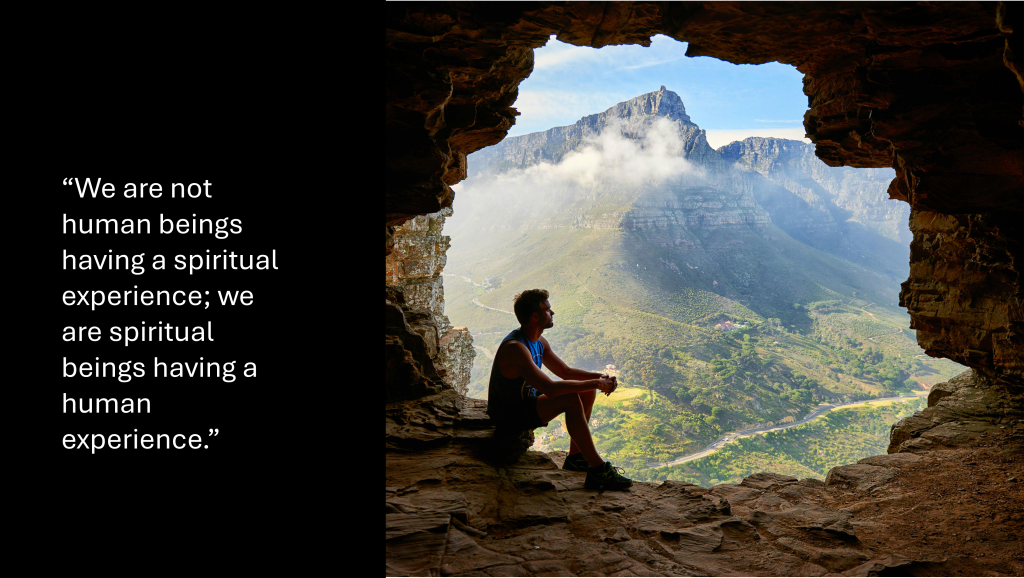9.3 Spiritual Terms

The quote in the image by Jesuit priest Pierre Teilhard de Chardin underscores the notion that the spirit is not only an aspect of the self but is, in fact, much more profound and central to our entire existence. It is what sustains and drives a person beyond experiences that can be directly sensed, felt, or physically interacted with. Rather, it shapes one’s sense of purpose, connection, and inner peace.
Spirituality differs from spiritual wellness in that it focuses more on the pursuit and alignment of beliefs and values with one’s sense of purpose and meaning rather than the active cultivation of well-being. Below is a list of terms that encompass the spiritual experience:
| Term | Definition | Primary Focus |
|---|---|---|
| Spirit | The deeper essence or core of a person is the intangible, animating part of one’s being that shapes purpose and drive. | Intrinsic aspect of self, beyond mind and body. |
| Spirituality | The personal or communal pursuit of meaning, purpose, and connection with something beyond oneself. | Exploration or practice of beliefs and values that transcend material concerns. |
| Spiritual Wellness | A process involving choices designed to seek and cultivate inner peace, harmony, and truth. | The ongoing process of caring for the spirit through habits, values, and reflection. |
| Spiritual Well-Being | The resulting state of feeling spiritually fulfilled, at peace, and aligned with one’s core values or Higher Power. | The outcome of spiritual wellness is characterized by inner peace, harmony, and authenticity. |
Role of the Higher Power
Regardless of one’s worldview, a key to cultivating spiritual well-being is to align more closely with a Higher Power. This represents an entity, force, principle, or system greater than the individual self that provides meaning, guidance, or a sense of connection beyond the individual self.
One’s Higher Power may take different forms depending on one’s perspective or belief system. Expand each perspective below to learn more.
Theistic Perspective
A deity or divine force (e.g., God, gods, universal consciousness) that provides purpose, moral and ethical guidance, connection, and direction towards what is “good.” This approach finds meaning in faith, spiritual teachings, sacred texts, and personal or communal experiences of the divine.
Agnostic Perspective
An unknown or unknowable force beyond human understanding that influences existence, offering a sense of awe, mystery, and meaning. This approach embraces mystery, draws wisdom from diverse sources, values personal experience, and finds spiritual fulfillment in awe and wonder.
Atheistic Perspective
A natural or conceptual force that transcends self-interest and personal ego. This approach finds purpose in collective well-being, recognizing our place in the universe, living by core values, and pursuing knowledge and growth.
Is a Higher Power Necessary?

If someone does not explicitly acknowledge or believe in a Higher Power external to themselves, they risk positioning their personal beliefs, reasoning, and values as their ultimate guiding authority. While this does not necessarily lead to self-deification (claiming to be God), it can impede spiritual growth and well-being. Consider the following:
Subjectivity and Moral Relativism
Without a higher and objective standard of what is “right” or “wrong” (good or bad), morality can become subjective, varying from person to person. This can lead to moral relativism, where what is considered “right” or “wrong” is based purely on individual or cultural preferences. This makes societal cohesion more difficult due to the absence of a shared, objective foundation for justice, ethics, or laws.
In extreme cases, moral relativism has justified harmful behaviours when individuals or societies redefine morality based on convenience or ideology. Examples from history include the atrocities committed under totalitarian regimes such as Nazi Germany, where morality was dictated by the state, leading to the murder of over 6 million Jews; the transatlantic slave trade, where entire societies justified the dehumanization of certain groups for economic gain; and the mass purges under Stalinist Russia, where dissent was criminalized, and morality was shaped to serve political power.
Self-Justification
Without an external reference point, individuals may rationalize their actions based on personal preferences rather than genuine moral reasoning. This is known as self-justification and can lead to arrogance, entitlement, narcissism, and an inability to recognize personal faults or wrongdoing.
Limited Perspective and Fallibility
Human beings are inherently limited in knowledge, wisdom, and foresight. When individuals act as their own highest authority, they risk becoming susceptible to cognitive biases (errors) such as:
-
Confirmation bias: The tendency to seek out information (or research) that supports what they already believe and ignore evidence that contradicts it.
-
Negativity bias: Paying more attention to negative experiences than positive ones, even if both are equally important.
-
Availability heuristic: Overestimating the importance of information that comes to mind quickly, like assuming air travel is dangerous after seeing a news report about a plane crash.
Lack of Ultimate Accountability
Particularly in theistic worldviews, belief in a Higher Power provides a sense of ultimate accountability, where actions are judged beyond human perception. Without this, accountability may be limited to legal consequences or social reputation, which may not always be enough to deter unethical behaviour when no one is watching.
Existential Crisis and Meaninglessness
A worldview without a Higher Power can lead to nihilism, where life is seen as ultimately meaningless. This may cause some individuals to struggle to find enduring motivation, meaning, or reason for ethical living beyond temporary personal satisfaction or immediate self-gratification.

